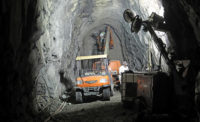With uncertainty in the air about how rapidly Congress will move on an economic stimulus package, President-elect Barack Obama urged lawmakers to act as quickly as possible on his still-developing plan, warning that if they do not, the current crisis will only worsen.

In a Jan. 8 speech at George Mason University in Virginia, Obama fleshed out some of the elements of the developing plan in more detail than he has so far, and reiterated that it would include aid for highways, school repairs, modernization of federal buildings and a boost for alternative energy. It would also include tax breaks for individuals. But he provided no specifics on its total funding or the relative shares its components would receive.
Obama said that the plan, which he called an "American Recovery and Reinvestment Plan," would call for doubling "the production of alternative energy in the next three years." He also said, "We will modernize more than 75% of federal buildings and improve the energy efficiency of two million American homes, saving consumers and taxpayers billions on our energy bills."
Pledging to "begin to rebuild America," he added that "we'll put people to work repairing crumbling roads, bridges, and schools by eliminating the backlog of well-planned, worthy and needed infrastructure projects."
In addition, he said the proposal will include "starting to build a new smart grid that will save us money, protect our power sources from blackout or attack, and deliver clean, alternative forms of energy to every corner of our nation.
Obama said Congress should "move as quickly as possible" to approve the recovery measure. "For every day we wait or point fingers or drag our feet, more Americans will lose their jobs," he warned. "And our nation will sink deeper into a crisis that, at some point, we may not be able to reverse."
Stephen Sandherr, CEO of the Associated General Contractors, said, "I think what he's doing is he's obviously trying to build public support for getting something done quickly. My own personal view is that the longer this hangs out there, the tougher it's going to be to get it done."
Shortly after Obama's speech, AGC released a survey of its members, that painted a grim picture. With construction work dropping off, the survey said an estimated two-thirds of non-residential contractors plan to institute layoffs, totaling about 30% of the current workforce.
AGC's survey showed current or expected downturns in all major construction sectors, including buildings, highways and utility work. Sandherr said, "Without a stimulus, construction companies will cut jobs, slash spending and continue to be among the hardest-hit sectors within our economy."
But if the stimulus plan becomes a reality and includes aid for infrastructure projects, AGC said contractors would boost their workforces by 25%.
Responding to calls from governors around the country, the President-elect Said, "We'll help struggling states avoid harmful budget cuts, as long as they take responsibility and use the money to maintain essential services like police, fire, education, and health care.
Obama also repeated that the stimulus plan would be "free from earmarks and pet projects."
He said, "It isn't just another public works program," but would make investments in areas like education, energy, health care and infrastructure that would provide longer-range benefits to the country.





